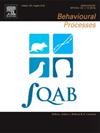在圈养的黑顶山雀群体聚集后,个体的声音身份可能会变得模糊。
IF 1.3
4区 生物学
Q4 BEHAVIORAL SCIENCES
引用次数: 0
摘要
黑冠山雀(Poecile atricapillus)的叫声在它们的一生中都是塑料的。虽然幼鸟利用声音的可塑性通过导师的模仿来完善他们的发声,但成年人利用声音的可塑性来创造独特的人口方言。声音趋同是一种机制,通过这种机制,鸟群的声音变得越来越相似,与其他鸟群的声音不同。在野生和实验室群鸟饲养的山雀群中观察到通过声音趋同产生的啼叫可塑性。我们的研究旨在回答单独饲养的实验室山雀群落是否具有与野生种群相似的独特声乐方言。一组来自两个实验室群体房间的六只单独饲养的山雀被引入到一个新的实验群体房间。在基线和之后的8周每周记录电话。然后,我们使用非实验群体鸟类的Go/No-go范式进行了操作性条件反射研究,以确定黑冠山雀是否可以区分来自两个实验室群体的呼叫,使用四个实验群体鸟类的基线预组装录音作为判别刺激。我们使用来自剩下的两只实验群鸟的新颖的预组装呼叫来测试泛化。接下来,我们测试了山雀在实验群体聚集后是否察觉到叫声的变化,这是一种声音可塑性的推测,其特征是辨别准确性的降低。山雀通过预集合的叫声成功地区分了强化和非强化的叫声,但当后来看到来自新鸟的新的预集合叫声时,这种学习并没有推广。我们假设,山雀依赖于基于个体的歧视,而不是基于群体的歧视。山雀在听到同一只鸟的集合后的叫声时,也不能概括他们的学习。我们的研究结果表明,在操作性条件反射过程中,山雀能够区分个体的叫声,而不是群体的叫声。此外,山雀可以感知到集合前和集合后呼叫的差异。综上所述,这些发现表明群体和个人身份信息可能是相关的,因为装配后的声音可塑性阻碍了个体歧视。本文章由计算机程序翻译,如有差异,请以英文原文为准。
Individual vocal identity may be obscured following colony assembly in captive black-capped chickadees
Black-capped chickadee (Poecile atricapillus) vocalisations remain plastic throughout their lifespans. Although fledglings employ vocal plasticity to refine their vocalisations through the use of tutor mimicry, adults employ vocal plasticity to create unique population dialects. Vocal convergence is one mechanism by which flockmates’ vocalisations become increasingly similar to each other and distinct from the calls of other flocks. Chick-a-dee call plasticity via vocal convergence has been observed in wild and group aviary-housed laboratory chickadee flocks. Our study aimed to answer whether individually-housed laboratory chickadee colonies possess unique vocal dialects similar to wild populations. A group of six individually-housed chickadees from two laboratory colony rooms were introduced to a new experimental colony room. Calls were recorded at baseline and weekly thereafter for eight weeks. We then conducted an operant conditioning study using a Go/No-go paradigm with birds not included in our experimental-colony, to determine whether black-capped chickadees could discriminate between calls from the two laboratory colonies, using four experimental-colony birds’ baseline pre-assembly recordings as discriminative stimuli. We tested generalisation using novel, pre-assembly calls from the remaining two experimental-colony birds. Next, we tested whether chickadees perceived a change in calls following experimental-colony assembly, putatively indicative of vocal plasticity, marked by a decrease in discrimination accuracy. Chickadees successfully discriminated reinforced from non-reinforced calls using pre-assembly calls, but did not generalise this learning when later presented with novel pre-assembly calls from new birds. We posit that instead of employing colony-based discrimination, chickadees relied on individual-based discrimination. Chickadees were also not able to generalise their learning when presented with post-assembly calls from the same birds. Our findings suggest that chickadees were able to discriminate among individuals’, but not colonies’, chick-a-dee calls in an operant-conditioning procedure. Furthermore, chickadees can perceive differences in pre-versus-post assembly calls. Taken together, these findings suggest that group and individual identity information may be correlated, as post-assembly vocal plasticity impeded individual discrimination.
求助全文
通过发布文献求助,成功后即可免费获取论文全文。
去求助
来源期刊

Behavioural Processes
生物-动物学
CiteScore
2.70
自引率
7.70%
发文量
144
审稿时长
4-8 weeks
期刊介绍:
Behavioural Processes is dedicated to the publication of high-quality original research on animal behaviour from any theoretical perspective. It welcomes contributions that consider animal behaviour from behavioural analytic, cognitive, ethological, ecological and evolutionary points of view. This list is not intended to be exhaustive, and papers that integrate theory and methodology across disciplines are particularly welcome.
 求助内容:
求助内容: 应助结果提醒方式:
应助结果提醒方式:


